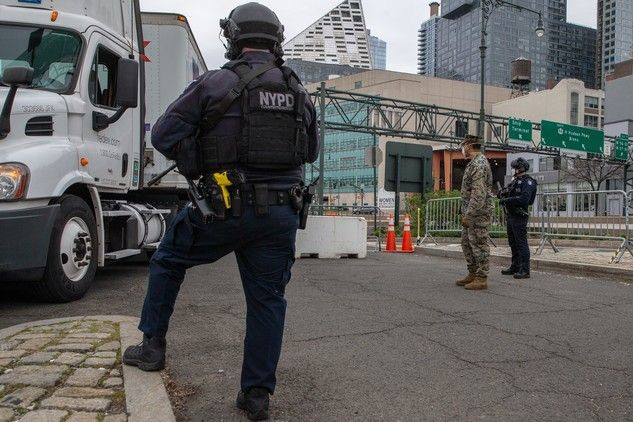Coronavirus New York: Trucks Used For Dead Bodies May Now Haul Food, FDA Says

KEY POINTS
- Refrigerated trucks used for storing COVID-19 bodies may now return to hauling food
- The FDA has a guide on disinfecting and ensuring these trucks are virus-free
- The trucks will be the defining symbol of this era, a New York doctor said
The refrigerated trucks that were temporarily used for storing dead bodies from New York hospitals, morgues and funeral homes, when COVID-19 cases overwhelmed the United States healthcare system, may now return to transporting and storing food, the Food and Drug Administration (FDA) said.
The FDA released a guide on what must be done to these food transport vehicles and refrigerated mobile storage units, which had blood and bodily fluids from deceased COVID-19 patients, after receiving inquiries from the public.
"When additional refrigerated storage is no longer needed, the industry may wish to return the trailers and storage units to use for food transport and storage," the guide stated.
The FDA also said these storage trucks are easy to clean and disinfect using EPA-registered disinfectants.
"Some surfaces may require repeat applications to ensure treatment for the required contact time,” the FDA’s guide underscored. “Also, because some disinfectants may not be effective at refrigeration temperatures (check the label), interiors may need to be brought to the appropriate temperature before disinfection."
They are literally forklifting dead bodies into refrigerated trucks outside hospitals in New York. 524 dead in the last 24 hours. Keep calling it a hoax... pic.twitter.com/wQRnBrdwt7
— Mark (@PhillytoStPete) April 3, 2020
The novel coronavirus spreads via respiratory droplets and may not be transmitted through food. According to the Centers for Disease Control and Prevention (CDC), the risk of contracting the virus from touching surfaces, objects and boxes may be very low.
“In general, because of poor survivability of these coronaviruses on surfaces, there is likely very low risk of spread from food products or packaging,” the CDC stated.
However, trucks with traces of blood and bodily fluids that cannot be cleaned must no longer be used for its original purpose of transporting food. If offensive odor still permeates in the storage unit, despite repeated disinfection, then the truck must not be used to haul food any longer.
If the truck's surface is damaged, cracked and porous, then it won't be properly disinfected. Thus, it must not be used for food deliveries as well.
Meanwhile, Dr. Jeremy Rose from Manhattan's Mount Sinai Beth Israel Hospital wrote in a piece on The Washington Post the refrigerated trucks will be a defining symbol of this era.
"Every disaster has its images, its symbols," Rose wrote. "For COVID-19, it might just be the refrigerator truck. It's our overflow morgue, holding the patients we could not save."
© Copyright IBTimes 2025. All rights reserved.





















